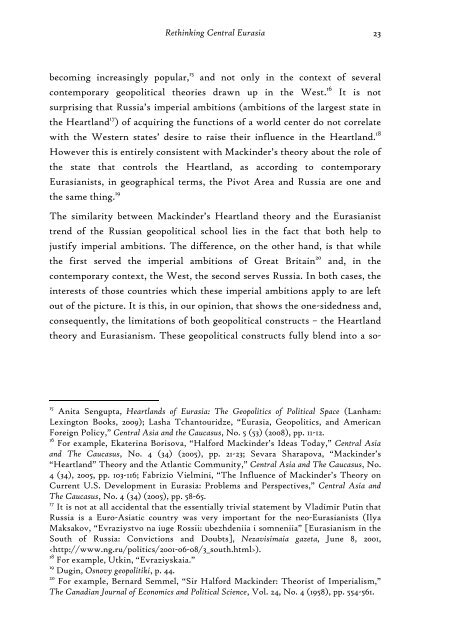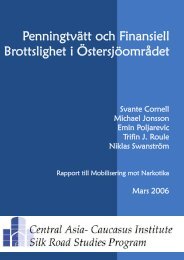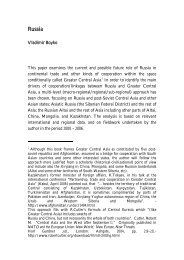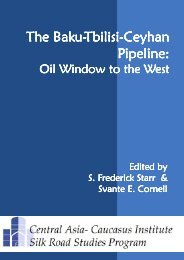Eurasianism and the Concept of Central Caucaso-Asia
Eurasianism and the Concept of Central Caucaso-Asia
Eurasianism and the Concept of Central Caucaso-Asia
You also want an ePaper? Increase the reach of your titles
YUMPU automatically turns print PDFs into web optimized ePapers that Google loves.
Rethinking <strong>Central</strong> Eurasia 23<br />
becoming increasingly popular, 15 <strong>and</strong> not only in <strong>the</strong> context <strong>of</strong> several<br />
contemporary geopolitical <strong>the</strong>ories drawn up in <strong>the</strong> West. 16 It is not<br />
surprising that Russia’s imperial ambitions (ambitions <strong>of</strong> <strong>the</strong> largest state in<br />
<strong>the</strong> Heartl<strong>and</strong> 17 ) <strong>of</strong> acquiring <strong>the</strong> functions <strong>of</strong> a world center do not correlate<br />
with <strong>the</strong> Western states’ desire to raise <strong>the</strong>ir influence in <strong>the</strong> Heartl<strong>and</strong>. 18<br />
However this is entirely consistent with Mackinder’s <strong>the</strong>ory about <strong>the</strong> role <strong>of</strong><br />
<strong>the</strong> state that controls <strong>the</strong> Heartl<strong>and</strong>, as according to contemporary<br />
Eurasianists, in geographical terms, <strong>the</strong> Pivot Area <strong>and</strong> Russia are one <strong>and</strong><br />
<strong>the</strong> same thing. 19<br />
The similarity between Mackinder’s Heartl<strong>and</strong> <strong>the</strong>ory <strong>and</strong> <strong>the</strong> Eurasianist<br />
trend <strong>of</strong> <strong>the</strong> Russian geopolitical school lies in <strong>the</strong> fact that both help to<br />
justify imperial ambitions. The difference, on <strong>the</strong> o<strong>the</strong>r h<strong>and</strong>, is that while<br />
<strong>the</strong> first served <strong>the</strong> imperial ambitions <strong>of</strong> Great Britain 20 <strong>and</strong>, in <strong>the</strong><br />
contemporary context, <strong>the</strong> West, <strong>the</strong> second serves Russia. In both cases, <strong>the</strong><br />
interests <strong>of</strong> those countries which <strong>the</strong>se imperial ambitions apply to are left<br />
out <strong>of</strong> <strong>the</strong> picture. It is this, in our opinion, that shows <strong>the</strong> one-sidedness <strong>and</strong>,<br />
consequently, <strong>the</strong> limitations <strong>of</strong> both geopolitical constructs – <strong>the</strong> Heartl<strong>and</strong><br />
<strong>the</strong>ory <strong>and</strong> <strong>Eurasianism</strong>. These geopolitical constructs fully blend into a so-<br />
15<br />
Anita Sengupta, Heartl<strong>and</strong>s <strong>of</strong> Eurasia: The Geopolitics <strong>of</strong> Political Space (Lanham:<br />
Lexington Books, 2009); Lasha Tchantouridze, “Eurasia, Geopolitics, <strong>and</strong> American<br />
Foreign Policy,” <strong>Central</strong> <strong>Asia</strong> <strong>and</strong> <strong>the</strong> Caucasus, No. 5 (53) (2008), pp. 11-12.<br />
16<br />
For example, Ekaterina Borisova, “Halford Mackinder’s Ideas Today,” <strong>Central</strong> <strong>Asia</strong><br />
<strong>and</strong> The Caucasus, No. 4 (34) (2005), pp. 21-23; Sevara Sharapova, “Mackinder’s<br />
“Heartl<strong>and</strong>” Theory <strong>and</strong> <strong>the</strong> Atlantic Community,” <strong>Central</strong> <strong>Asia</strong> <strong>and</strong> The Caucasus, No.<br />
4 (34), 2005, pp. 103-116; Fabrizio Vielmini, “The Influence <strong>of</strong> Mackinder’s Theory on<br />
Current U.S. Development in Eurasia: Problems <strong>and</strong> Perspectives,” <strong>Central</strong> <strong>Asia</strong> <strong>and</strong><br />
The Caucasus, No. 4 (34) (2005), pp. 58-65.<br />
17<br />
It is not at all accidental that <strong>the</strong> essentially trivial statement by Vladimir Putin that<br />
Russia is a Euro-<strong>Asia</strong>tic country was very important for <strong>the</strong> neo-Eurasianists (Ilya<br />
Maksakov, “Evraziystvo na iuge Rossii: ubezhdeniia i somneniia” [<strong>Eurasianism</strong> in <strong>the</strong><br />
South <strong>of</strong> Russia: Convictions <strong>and</strong> Doubts], Nezavisimaia gazeta, June 8, 2001,<br />
).<br />
18<br />
For example, Utkin, “Evraziyskaia.”<br />
19<br />
Dugin, Osnovy geopolitiki, p. 44.<br />
20<br />
For example, Bernard Semmel, “Sir Halford Mackinder: Theorist <strong>of</strong> Imperialism,”<br />
The Canadian Journal <strong>of</strong> Economics <strong>and</strong> Political Science, Vol. 24, No. 4 (1958), pp. 554-561.






